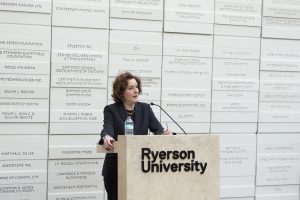Feb. 28, 2018
By STEFANIE PHILLIPS
Special to the RJRC
First published on RSJ website

After the cameras are turned off and the notebooks are put away, journalists often drive away from their sources without thinking about the consequences that arise in the dust of their tires. But Carol Off, host of CBC Radio’s As It Happens, says it’s time journalists started thinking about what they leave behind.
In her delivery of the 2018 Atkinson Lecture on Feb. 14, Off told a room full of journalism students to acknowledge their presence has an effect on their sources and to consider how that presence can have ramifications for those people.
“As soon as we arrive at an event we are covering we have altered its course,” she said from the podium in the Sears Atrium in the George Vari Engineering and Computing Centre. “Even if you are a fly on the wall you have left fly spots, one way or another, and we are not flies we are bulldozers; we have impact.”
As a veteran journalist with extensive experience covering Canadian and international affairs, including conflicts in the Middle East, Haiti and the Balkans, Off was able to share her wisdom with the crowd.
She said protecting sources from harm should be a priority for journalists, especially young people who would rationally defy authority by speaking out. She said journalists can protect them by being honest about their intentions, warning them of possible consequences and guarding their privacy when necessary. Sometimes, she said, it even means leaving some of the information out of the published story.
“Without sources, we would have no journalists,” she said. “They want to have a voice and we want to tell their story to provide an outlet for that voice.”
Off also talked about her relationship with the family of Asad Aryubwal, the Afghan man at the centre of her new book, All We Leave Behind, with whom Off cultivated a more personal friendship. When Aryubwal became a key source in Off’s coverage of the country’s warlords, his family was sent into exile, uncertain of their future.
Feeling responsible for their hardship, Off decided to cross the line from being a disinterested journalist to a friend, becoming a key player in his family’s removal from Afghanistan and entry to Canada.
“Ironically the consequences of my contact with him led to my decision to get more involved because I was already involved. I had been involved since the moment we met,” she said.
Off said it can be hard to decide when to cross that line, but for her the answer was clear.
“I had a moral obligation beyond my role as a reporter.”
First-year journalism student, Chloe Cook, said hearing from Off will make her more aware of the questions she asks her sources in future reporting.
“I’ll be able to be more critical of what I’m writing instead of just not really thinking about it and slapping things together,” she said after the lecture.
Fellow journalism student, Samantha Moya, 22, said the lecture sparked a lot of “confusion” because it made her realize how her biases can be tightly woven into her reporting.
“Because of where I stand in this world as a person there are so many injustices that I see and if my biases can’t be a thing that affects my reporting, how can I do this job?”
Off gave students some advice, telling them to remember they are human beings first and reporters second.
“We shouldn’t convince ourselves we are God’s gift,” she said. “Never forget your personal obligations.”
A video of the lecture is available here.
